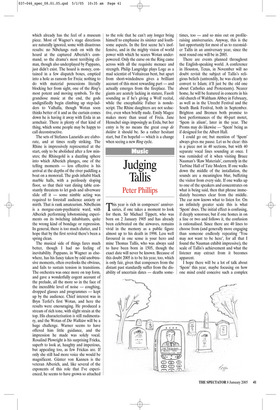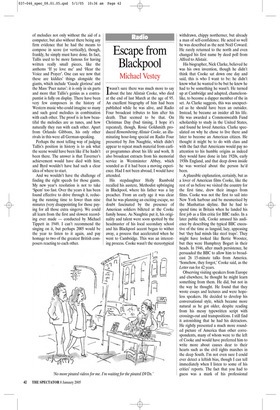Judging Tallis
Peter Phillips
This year is rich in composers’ anniversaries, if one takes a moment to look for them. Sir Michael Tippett, who was born on 2 January 1905 and has already been celebrated on the airwaves, remains vivid in the memory as a public figure almost up to his death in 1998. Less well favoured in one sense is your hero and mine Thomas Tallis, who was always said to have been born in 1505, though the exact date will never be known. Because of this doubt 2005 is to be his year, too, which is only fair, given that composers from the distant past standardly suffer from the disability of uncertain dates — deaths some times, too — and so miss out on profileraising anniversaries. Anyway, this is the last opportunity for most of us to reconsider Tallis in an anniversary year, since the next round one will be in 2085.
There are events planned throughout the English-speaking world. A conference in Houston, Texas, in November will no doubt revisit the subject of Tallis’s religious beliefs (untrendily, he was clearly no convert to Islam; it’ll just be the old one about Catholics and Protestants). Nearer home, he will be featured in concerts in his old church of Waltham Abbey in February, as well as in the Utrecht Festival and the South Bank Festival, both in September. Brighton and Bremen both promise to host performances of the 40-part motet, ‘Spem in alium’, later in the year. The Proms may do likewise — ‘Spem’ being as if designed for the Albert Hall.
I could go on; but mention of ‘Spem’ always gives me pause. Let us be clear: this is a piece not in 40 sections, but with 40 separate vocal lines sounding at once. I was reminded of it when visiting Bruce Nauman’s ‘Raw Materials’, currently in the Turbine Hall of Tate Modern. If one walks down the middle of the installation, the sounds are a meaningless blur, buffeting the visitor from every side. If one walks up to one of the speakers and concentrates on what is being said, then that phrase immediately becomes clear from the middle. The ear now knows what to listen for. On an infinitely greater scale this is what ‘Spem’ does. The initial effect is confusing, if deeply sonorous; but if one homes in on a line or two and follows it, the confusion is rationalised. Since there are 40 lines to choose from (and generally more engaging than someone endlessly repeating ‘You may not want to be here’, for all that I found the Nauman exhibit impressive), the scale of Tallis’s achievement and what the listener may extract from it becomes apparent.
I hope there will be a lot of talk about ‘Spem’ this year, maybe focusing on how one mind could conceive such a complex of melodies not only without the aid of a computer, but also without there being any firm evidence that he had the means to compose in score (or vertically), though, frankly, he simply must have done. In fact, Tallis used to be more famous for having written really small pieces, like the anthems ‘If ye love me’ and ‘Hear the Voice and Prayer’. One can see now that these are kiddies’ things alongside the giants, which include ‘Gaude gloriosa’ and the Mass ‘Puer natus’: it is only in six parts and more that Tallis’s genius as a contrapuntist is fully on display. There have been very few composers in the history of Western music who could imagine so many and such good melodies in combination with each other. The proof is in how beautiful the melodies are as tunes, and how naturally they run with each other. Apart from Orlando Gibbons, his only other rivals in this were all German-speaking.
Perhaps the most telling way of judging Tallis’s position in history is to ask what the scene would have been like if he hadn’t been there. The answer is that Taverner’s achievement would have died with him; and Byrd wouldn’t have had such a clear idea of where to start.
And we wouldn’t have the challenge of finding the right speeds for those giants. My new year’s resolution is not to take ‘Spem’ too fast. Over the years it has been found effective to drive through it, reducing the running time to fewer than nine minutes (very disappointing for those paying for all those extra singers). We could all learn from the first and slowest recording ever made — conducted by Michael Tippett in 1949. I can’t recommend the singing on it, but perhaps 2005 would be the year to listen to it again, and pay homage to two of the greatest British composers reacting to each other.











































 Previous page
Previous page